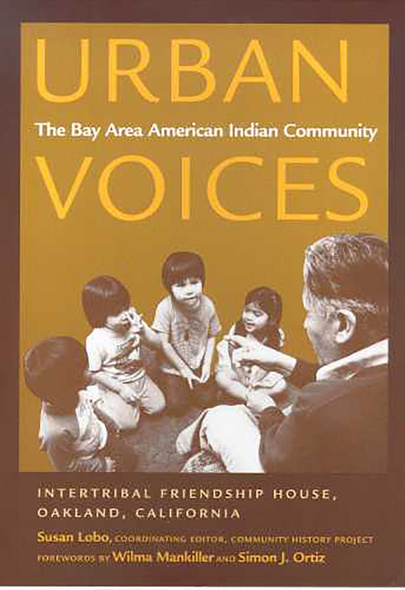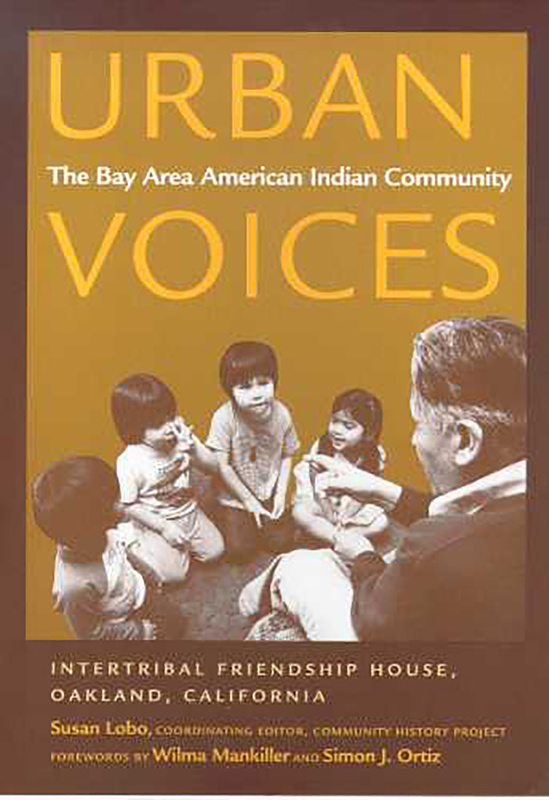Urban Voices
The Bay Area American Indian Community
SERIES:
The University of Arizona Press
California has always been America's promised land—for American Indians as much as anyone. In the 1950s, Native people from all over the United States moved to the San Francisco Bay Area as part of the Bureau of Indian Affairs Relocation Program. Oakland was a major destination of this program, and once there, Indian people arriving from rural and reservation areas had to adjust to urban living. They did it by creating a cooperative, multi-tribal community—not a geographic community, but rather a network of people linked by shared experiences and understandings. The Intertribal Friendship House in Oakland became a sanctuary during times of upheaval in people's lives and the heart of a vibrant American Indian community. As one long-time resident observes, "The Wednesday Night Dinner at the Friendship House was a must if you wanted to know what was happening among Native people." One of the oldest urban Indian organizations in the country, it continues to serve as a gathering place for newcomers as well as for the descendants of families who arrived half a century ago. This album of essays, photographs, stories, and art chronicles some of the people and events that have played—and continue to play—a role in the lives of Native families in the Bay Area Indian community over the past seventy years. Based on years of work by more than ninety individuals who have participated in the Bay Area Indian community and assembled by the Community History Project at the Intertribal Friendship House, it traces the community's changes from before and during the relocation period through the building of community institutions. It then offers insight into American Indian activism of the 1960s and '70s—including the occupation of Alcatraz—and shows how the Indian community continues to be created and re-created for future generations. Together, these perspectives weave a richly textured portrait that offers an extraordinary inside view of American Indian urban life. Through oral histories, written pieces prepared especially for this book, graphic images, and even news clippings, Urban Voices collects a bundle of memories that hold deep and rich meaning for those who are a part of the Bay Area Indian community—accounts that will be familiar to Indian people living in cities throughout the United States. And through this collection, non-Indians can gain a better understanding of Indian people in America today. "If anything this book is expressive of, it is the insistence that Native people will be who they are as Indians living in urban communities, Natives thriving as cultural people strong in Indian ethnicity, and Natives helping each other socially, spiritually, economically, and politically no matter what. I lived in the Bay Area in 1975-79 and 1986-87, and I was always struck by the Native (many people do say 'American Indian' emphatically!) community and its cultural identity that has always insisted on being second to none. Yes, indeed this book is a dynamic, living document and tribute to the Oakland Indian community as well as to the Bay Area Indian community as a whole." —Simon J. Ortiz "When my family arrived in San Francisco in 1957, the people at the original San Francisco Indian Center helped us adjust to urban living. Many years later, I moved to Oakland and the Intertribal Friendship House became my sanctuary during a tumultuous time in my life. The Intertribal Friendship House was more than an organization. It was the heart of a vibrant tribal community. When we returned to our Oklahoma homelands twenty years later, we took incredible memories of the many people in the Bay Area who helped shape our values and beliefs, some of whom are included in this book." —Wilma Mankiller, former Principal Chief, Cherokee Nation
An excellent project that brings to life an important slice of the American Indian urban experience . . . The approach of the book is not academic. It is perhaps more respectful, uniquely so, because it does not analyze; it simply lets people tell their own story. And what a great and overdue story it is.' Indian Country Today'A moving account of the intertwined lives of Native people . . . Written in multigenerational, polyphonic voices, the book captures the intricate web of relationships that have been tended to and cared for by generations of city dwellers who more often than not retain dynamic ties with their home communities.' News from Native California
Susan Lobo is a cultural anthropologist who has worked as a consultant for American Indian tribes and community organizations throughout the Americas.
Foreword, by Wilma Mankiller
Foreword, by Simon Ortiz
Introduction, by Editorial Committee
PART 1 THE BEGINNINGS
PART 2 RELOCATION
PART 3 BUILDING COMMUNITY
PART 4 TIMES OF CHANGE
PART 5 CREATING A COMMUNITY FOR FUTURE GENERATIONS
Source Acknowledgments
Illustration Credits
Contributing Editors






